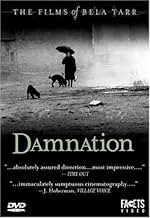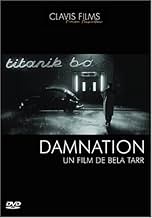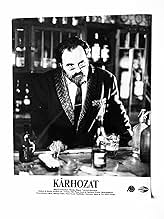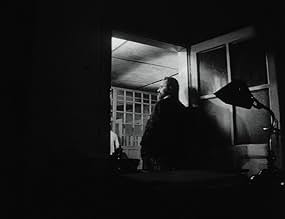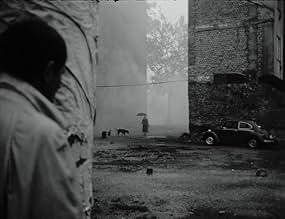IMDb RATING
7.6/10
7.2K
YOUR RATING
A lonely barfly falls in love with a married bar singer.A lonely barfly falls in love with a married bar singer.A lonely barfly falls in love with a married bar singer.
- Awards
- 2 wins & 1 nomination total
- Director
- Writers
- All cast & crew
- Production, box office & more at IMDbPro
Featured reviews
Yes, this is not for every movie goer. But it rewards those who love the art of film making. Very stylized, yes, but directed by someone who has chosen film as his medium for expresses and articulating a world view that is bleak, atheistic and unforgiving. You may not "like" this film: but as an antidote to all that is superficial, crass and commercial it is terrific. To some, it is intellectual masturbation: to those who see film as an art form, a movie to be admired, debated and savored. It will be seen by fewer than those who enter any "Blockbuster" video store on any given day- but, God help me, I would rather see this film than any other at that store.
An exceptionally brilliant movie. But this is not for everyone. Beautifully shot in black and white, the director bravely specialises in spectacularly lengthy shots which the viewer's brain will either become absorbed by or reject for tedium. An interesting dimension which can heighten involvement in these long shots (or annoy the hell out the unconvinced) is rhythmical sound - be it cranky machinery (like the relentless mechanical pulley system outside the 'central' character's window) or people dancing to cabaret music. There is a detachment to the camera-work, particularly in the dance band sequences, which reminded me of Kubrick. Again this is an approach which will alienate many viewers but it lends a kind of philosophical power what would otherwise be mundane documentary social observation.
I watched this after the more recent Werckmeister Harmonies on the current double-disc DVD edition available in the UK which is a superb issue and has an interview with the Director as a bonus feature. Interesting to note that he states quite categorically that he intends no allegorical/symbolic element to his work.
I watched this after the more recent Werckmeister Harmonies on the current double-disc DVD edition available in the UK which is a superb issue and has an interview with the Director as a bonus feature. Interesting to note that he states quite categorically that he intends no allegorical/symbolic element to his work.
Damnation was one of those rare instances when I felt both frustrated and fascinated by the film I was watching. Bela Tarr is SO adept at creating mood that the light sketches of plot began to feel superfluous, and I found myself wanting to brush them away and just float in this surreal sludge without trying to follow a 'story'. Tarr's use of sound design and music to create tension and a dream-like state come closer to David Lynch's than anything else I've seen. The original (I'm assuming) songs in the film also share that distinctive quality of mimicking a certain genre of familiar music, while having something that's a bit off about them - much like Badalamenti's scores. Interesting to note that Blue Velvet was released two years prior. The slowly gliding camera, which seems to have almost it's own agenda aside from the film ads to the purveying sensation of unease, and the exquisite lighting and black and white tones are breathtakingly stark. There are moments in the film when there is so much going on in the scene, and the shot is so lengthy, that the situation itself becomes real and transcends the fiction of the film. This is a very rare phenomenon in film, and was absolutely spellbinding - especially the dance scene. The middle of the film gets heavy with bleak philosophical exchanges, which would be better illustrated than told - especially with Tarr's incredible gift for mis en scene and sound design. Iconographic sequences like the slow pan past the miserable crowds waiting for the rain to stop, or the reoccurring pack of wild dogs speak volumes more of Tarr's theme than the most eloquent words. The characters are like automatons shuffling about in a purgatory from which there is no escape. It is as though the entire world was a flea-bag apartment building, a tattered old bar, and a vast field of mud and debris which one must traverse between the two.
I watch Bela Tarr's films over again with endless fascination. The length is not a problem: No longer that many pieces of music. If you can concentrate through a Wagner opera and I hope you can, then a Tarr film is not very long. All the films are very much products of team work but lead by an autocratic man who knows exactly what he wants, hence the seam free quality of the experience, It is that, rather than the length which requires the concentration. I have not found it mentioned often enough but there is much humour in his films, Karrer does a reprise of Gene Kelly, which is then itself parodied near the end of the film. Damnation is maybe still my favourite, I suppose for the mesmerising way sound is used to structure a complex web of association, but then all of the available late films has so much to offer
Damnation (1988) ****
Although he made a number of feature films previous to Damnation, this is where Bela Tarr found his trademark style. It was also his first collaboration with novelist and country man Laszlo Krasznahorkai; a collaboration which continues to this day.
The film opens with now trademark Tarr style, watching mining carts travel along with their loads for a few minutes (yes minutes). The camera slowly pulls back to reveal Karrer (Miklós Székely) shaving. He's a lonely loser, slowly drinking himself to death at the Titanik Bar. He is in love with and sleeping with the lounge singer there (Vali Kerekes). The problem, however, is that she is married, and has made no secret of wanting to end their affair. That when he asks her why she doesn't love him, and she replies "I love you and you know it," is of no real matter to her.
Karrer is offered a smuggling job by the bar's shady owner. He decides to offer the job to the singer's husband, who has built up a substantial debt and is in danger of being imprisoned for it. He accepts, and Karrer wins himself three days to swoon the singer. She denies him, nevertheless sleeping with him in perhaps the least passionate sex scene ever filmed. A bitter Karrer decides he will turn in to the authorities her husband when he returns from his smuggling job, leaving her alone and thus making him now the logical option. By the end, the lives of Damnation's characters will be as broken and desolate as the crumbling town in which they live.
Damnation plays as love triangle, grounded out over nearly two hours. Tarr's long shots and elegantly bleak black and white photography follows ever so slowly the action. The lighting is impeccable, creating ghostly silhouettes, dusty and dim barrooms, and elegant and shimmering light bouncing of the face and hair of the lounge singer. As characteristic of Bela Tarr, the cinematography is stately and assured, breathtaking and deliberate. He films his characters and their town as assuredly and respectfully as possible. The town, and the dogs which walk its streets, hint at the apocalyptic undertones of the film, and transcends all emotions, or lack there of.
I have had reservations about Damnation in the past, confident that it was film-making at its very best, sublimely atmospheric and tonal, but unsure whether or not just how well it worked, particularly in relation to Tarr's two formidable masterpieces, Satantango and Werckmeister Harmonies. Those films have something mammoth and intimidating about them: Satantango, with its titanic length, clocking in at over 7 hours, all in the same style and minimal narrative; Werckmeister Harmonies with its bizarre metaphysical underpinnings and suggestive philosophy. Those films have a ground out dreamlike or perhaps nightmarish quality to them, particular Werckmeister Harmonies. After my fourth of fifth viewing of Damnation, I'm now assured that it does in fact work particularly when you avoid getting hung up on Tarr's other films. I'm also assured of its greatness. Damnation is a masterpiece of film-making. It draws parallels with the Italian realist films of the 50s and early 60s, as well as the minimalist transcendentalism of the films of Robert Bresson, but all the while invoking a dreamlike quality that keeps the viewer removed at just the right distance for a gritty but transcendent experience.
Although he made a number of feature films previous to Damnation, this is where Bela Tarr found his trademark style. It was also his first collaboration with novelist and country man Laszlo Krasznahorkai; a collaboration which continues to this day.
The film opens with now trademark Tarr style, watching mining carts travel along with their loads for a few minutes (yes minutes). The camera slowly pulls back to reveal Karrer (Miklós Székely) shaving. He's a lonely loser, slowly drinking himself to death at the Titanik Bar. He is in love with and sleeping with the lounge singer there (Vali Kerekes). The problem, however, is that she is married, and has made no secret of wanting to end their affair. That when he asks her why she doesn't love him, and she replies "I love you and you know it," is of no real matter to her.
Karrer is offered a smuggling job by the bar's shady owner. He decides to offer the job to the singer's husband, who has built up a substantial debt and is in danger of being imprisoned for it. He accepts, and Karrer wins himself three days to swoon the singer. She denies him, nevertheless sleeping with him in perhaps the least passionate sex scene ever filmed. A bitter Karrer decides he will turn in to the authorities her husband when he returns from his smuggling job, leaving her alone and thus making him now the logical option. By the end, the lives of Damnation's characters will be as broken and desolate as the crumbling town in which they live.
Damnation plays as love triangle, grounded out over nearly two hours. Tarr's long shots and elegantly bleak black and white photography follows ever so slowly the action. The lighting is impeccable, creating ghostly silhouettes, dusty and dim barrooms, and elegant and shimmering light bouncing of the face and hair of the lounge singer. As characteristic of Bela Tarr, the cinematography is stately and assured, breathtaking and deliberate. He films his characters and their town as assuredly and respectfully as possible. The town, and the dogs which walk its streets, hint at the apocalyptic undertones of the film, and transcends all emotions, or lack there of.
I have had reservations about Damnation in the past, confident that it was film-making at its very best, sublimely atmospheric and tonal, but unsure whether or not just how well it worked, particularly in relation to Tarr's two formidable masterpieces, Satantango and Werckmeister Harmonies. Those films have something mammoth and intimidating about them: Satantango, with its titanic length, clocking in at over 7 hours, all in the same style and minimal narrative; Werckmeister Harmonies with its bizarre metaphysical underpinnings and suggestive philosophy. Those films have a ground out dreamlike or perhaps nightmarish quality to them, particular Werckmeister Harmonies. After my fourth of fifth viewing of Damnation, I'm now assured that it does in fact work particularly when you avoid getting hung up on Tarr's other films. I'm also assured of its greatness. Damnation is a masterpiece of film-making. It draws parallels with the Italian realist films of the 50s and early 60s, as well as the minimalist transcendentalism of the films of Robert Bresson, but all the while invoking a dreamlike quality that keeps the viewer removed at just the right distance for a gritty but transcendent experience.
Did you know
- TriviaWith "Kárhozat / Damnation", the first of his collaborations with novelist Laszlo Krasznahorkai, Bela Tarr adopts a formally rigorous style, featuring long takes and slow tracking shots of the bleak landscape that surrounds the characters.
- GoofsIn the Dance/Party scene, the band and the music are clearly out of sync.
- Quotes
The Singer: I like the rain. I like to watch the water run down the window. It calms me down. I don't think about anything. I just watch the rain.
- ConnectionsEdited into Gli ultimi giorni dell'umanità (2022)
- How long is Damnation?Powered by Alexa
Details
- Runtime2 hours
- Color
- Sound mix
- Aspect ratio
- 1.66 : 1
Contribute to this page
Suggest an edit or add missing content




